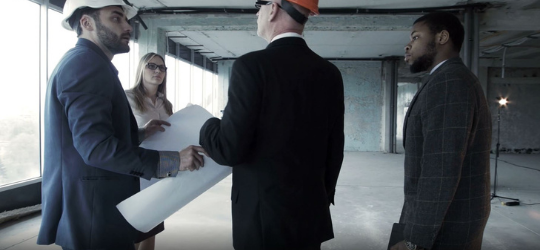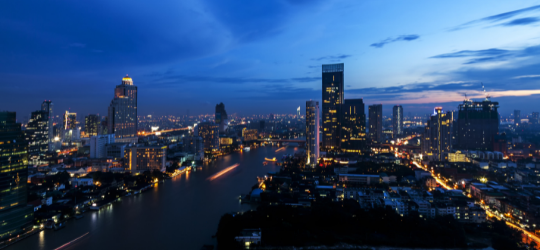Yash Lohia

Warwick alumnus Yash Lohia (BEng Engineering Business Management, 2009) is Chief Sustainability Officer of Indorama Ventures based in Bangkok, Thailand, having joined the family business in 2013.
Indorama Ventures is a global chemical company and the world’s largest producer of polyethylene terephthalate (PET) resin by capacity. PET is commonly known for its use in polyester fibres in clothing and containers for liquids and foods such as plastic bottles. It is a highly sustainable material and fully recyclable. As of December 2020, Indorama Ventures were recycling about 15 billion bottles a year globally. Discover more about Yash’s time at Warwick and how he has embedded sustainable practices across a global business.
What made you choose Warwick as a place to study?
Reputationally, Warwick was the best university I was accepted into. I didn’t have the best grades throughout my time at school, and as a result my school councillor suggested that I might not meet the grade requirements to be accepted to a university like Warwick. Despite this, I took the risk, applied and was successful in receiving a place and meeting the grade requirements.
What did you get from your time at Warwick?
I studied for a degree in Engineering Business Management, with a focus on Mechanical Engineering. I wanted a more practical education with more time in labs compared to lectures. Whilst studying for my degree, I developed a new ‘Engineering mindset’ which gave me a more methodological approach to solving problems. From that mindset, I was able to think of and ask the right questions of those around me.
What is your favourite memory of your time at Warwick?
I grew up in Bangkok, which is a very densely populated city and then had the contrast of moving to Rugby School (UK), which was set in the countryside. I enjoyed this change of scenery and when at Warwick, I enjoyed walking around the large, beautiful campus which had a similar countryside feel. I also liked making friends at Warwick, many of whom I am still in touch with.
You’ve quickly worked your way through the ranks at Indorama Ventures. What skills or values do you think helped you to do that and where did you develop these?
Logical thinking and the Engineering mindset mentioned above are the most valuable skills that I use every day. In joining the family business [Indorama Ventures], I had the opportunity to meet with a number of high-profile employees at an early stage of my career, many of whom had been working in the business for a long time. Applying these skills not only helped to further my own learning by asking the right questions but also challenged current practices, which sparked further discussion and thinking within the business.

BEng Engineering Business Management
Indorama Ventures has been a successful business for a long time. You’ve mentioned about logical thinking and the Engineering mindset but how else do you go about re-shaping an already thriving business to fit with new ways of thinking?
The family business has always been forward looking. This is an ethos that my father instilled right from the beginning. We are always willing to change and be adaptable to be successful. For example, between 2000 and 2010, there was an acquisition phase within the PET industry, and it was at this point that Indorama first expanded outside of Thailand and into the United States. We also acquired several new companies during this time, which brings the benefit of an immediate customer base and ready-made operational procedures.
After 2010 and based on changing customer demands and behaviours, the business transformed again by incorporating sustainability into everything that we do, whilst diversifying the range of products to include more sustainable polyester fibres, not just PET.
Last year, the business went through several structural changes and now includes more enabling functions such as Sustainability, Environmental Health and Safety, and Corporate Communications. This change has resulted in more delegation to these areas, something that is particularly important for the longevity of the business, as many of its founding members like my father, begin to reach retirement age.
You are currently Chief Sustainability Officer at Indorama Ventures. Can you tell us about how you have been able to develop a sustainable approach to production?
ESG (environmental, social and corporate governance) is an essential part of our business. Our customers want products to be sustainable and I also believe that the circular economy will drive future business practices, as opposed to the linear economy.
Sustainability is something that I am particularly passionate about and over the last few years I’ve implemented a five-pronged strategy with the aim of making Indorama a carbon neutral company. The five strategy streams are:
- To reduce CO2 emissions at each of our 135 manufacturing plants by improving operational efficiency – this includes simple solutions like upgrading boilers, chillers and improving consumption yield.
- Investing in renewable energy sources that are suitable and effective for each region, such as rooftop solar panels in Asia.
- ‘Deja’ – which is our sustainable products range made using recycled products, renewable energy sources, low impact water transport and locally sourced materials. Where we are unable to avoid emissions, we offset them to ensure carbon neutrality. For instance, we supported a project in Africa to make water accessible in an environmentally friendly way by digging boreholes.
- Identifying new sustainable technologies such as Carbon Capture Utilisation and Storage (CCUS) and green hydrogen, which can be incorporated into our manufacturing plants.
- Natural Capital Solutions – exploring partial or full ownership of carbon offsetting projects.
Covid-19 has been a significant challenge for all of us. How do you think it might change the way in which you do business long-term?
I expect to be travelling less. We’ve identified through Covid times that remote working can be an effective way of working. Indorama is a truly global organisation and before Covid-19, all my meetings would be taking place face-to-face, whereas now I can meet virtually with my teams all over the world, every day. As a result, we’ve seen an increase in productivity.
We also plan to continue delivering online learning opportunities to our teams through webinars, which has helped improve communication, skills, and knowledge sharing across the business. For example, I have held webinars with staff on how our sustainability strategy impacts them and how to communicate the strategy to our customers and communities effectively.
Despite this, I don’t know that remote working will continue to this extent forever. There are notable benefits of meeting people face-to-face. I personally enjoy that ‘human touch’ of being in a room with other people to discuss work and find it morale boosting.
Who have been the biggest influences on your career so far?
My Dad, for sure. He taught me how to think logically, ask the right questions and find anomalies that need correcting. My Mum, who also works within the company, taught me the value of getting to know my colleagues outside of work, which has enabled me to build strong relationships with those around me.
While I was growing up, I got to know UK-based steel magnate Lakshmi Mittal. I would often stay at his house in London instead of going back to Bangkok, while I was at school in the UK. He was great at asking questions, gathering information and had an enviable sense of curiosity in people. For instance, he would regularly ask me about school, my friends, university, and life in general. I try to apply this same attitude myself, being curious about other people, their work and their interests.
Finally, Bill Heinecke who sits on the Indorama Board and is an American-born businessman based in Thailand who owns hospitality, restaurant and lifestyle company Minor International. Although he is incredibly hard working, Bill taught me the importance of making time for my passions in life and not just living solely for work. He enjoys vintage cars and sailing, and I try to follow his attitude to make sure that I set time aside for my interests too.

Bangkok
How do you like to spend your time outside of Indorama?
My wife and I love to travel. I enjoy the quiet aspects of travel, especially when flying, where I get my much-needed alone time to think, watch a movie and ‘people watch’ in airports.
Living in a busy city like Bangkok, I don’t get a huge amount of quiet time, so I like to spend my spare time being surrounded by nature and going on walks in national parks. I also enjoy golf, running and snowboarding.
I would recommend going on a road trip too, I love that freedom of being able to go where I want to go, yet the comfort and security of being behind the car wheel. My favourite road trip is Arizona to Colorado, via Utah. The red rocks and vast, open landscapes are amazing. It sometimes feels like you are on Mars!
What piece of advice would you give to any of our graduating cohort that might want to work in a similar sector or role to you?
Be observant to the new trends that are developing, especially after Covid-19. Examine what products are on the supermarket shelves, ask people questions to find out how the last 18 months have been for them, which can help to build your knowledge. Equally, make time for yourself to travel and gain new experiences, these can provide interesting talking points on your CV to give you an advantage in the job market.
What are your plans for the future?
Now that I am married, I would love to start a family and have children. I am looking forward to the world hopefully going back to ‘normal’ so that I can start travelling again and reconnecting with friends and colleagues from across the globe.
From a work perspective, I am looking forward to implementing all the plans we have been developing whilst working from home.
Image credit: Indorama Ventures
